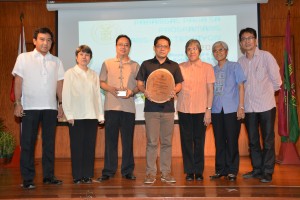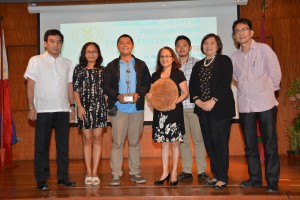 The Geography Field School (GFS) program of the Department of Geography, College of Social Sciences and Philosophy, and the KaSaMa Teachers Online Community of the National Institute for Science and Mathematics Education Development (NISMED) were the awardees of the first Parangal Para sa Programang Pang-Ektensiyon.
The Geography Field School (GFS) program of the Department of Geography, College of Social Sciences and Philosophy, and the KaSaMa Teachers Online Community of the National Institute for Science and Mathematics Education Development (NISMED) were the awardees of the first Parangal Para sa Programang Pang-Ektensiyon.
Held on May 17 at the Malcolm Auditorium, College of Law, the award is meant to recognize the importance of extension programs in UPD and is conferred to programs with significant contribution to the achievement of the vision/mission of the unit and the University.
According to UPD Vice Chancellor for Research and Development Fidel R. Nemenzo, the award is part of UPD’s effort of putting in place procedures and mechanisms that aim to institutionalize extension work as a core function of the University. “Instruction, research and extension are the three important and complementary mandates of UP,” Nemenzo said.
UPD Chancellor Michael L. Tan said, “We are giving recognition of extension works or projects that look long-term and/or those programs helping people help themselves.”
The award has two categories: extension programs for degree-granting units and extension programs for non degree-granting units.
GFS, the awardee for the degree-granting units category, is a course-based extension program offered by the Department of Geography every mid-year term. The students undertake rigorous procedures for data (geophysical, socioeconomic, demographic, infrastructure and institutional) collection, consolidation, validation, analysis and data abstraction to ensure the most effective delivery of important information. Comprehensive sets of data are then utilized by policy and decision-makers for local development planning.
 The Department of Geography has collaborated with local government units, people’s organizations, academic and research institutions, non-government organizations and community members towards the enhancement of their capacities to make informed decisions through research, technical assistance and utilization of geographic information resources and tools such as the Geographic Information System. The course supports the development planning process at the provincial, municipal and community levels.
The Department of Geography has collaborated with local government units, people’s organizations, academic and research institutions, non-government organizations and community members towards the enhancement of their capacities to make informed decisions through research, technical assistance and utilization of geographic information resources and tools such as the Geographic Information System. The course supports the development planning process at the provincial, municipal and community levels.
GFS has assisted more than 40 barangays, municipalities and cities all over the Philippines. Over the past three years, the GFS was conducted in the following areas; Ligao, Albay; Candelaria, Quezon; Pagudpod and Adams, Ilocos Norte; Bokod, Benguet; Sibalom, Antique; and Basud and Paracale, Camarines Norte.
On the other hand, NISMED’s KaSaMa Teachers which stands for Ka-Science Ka-Mathematics Teachers, is an online community of science and mathematics educators who strive for excellence through innovation and collaboration.
By participating in the online community, science and mathematics educators will be able to gain access to high-quality information and resources on science and mathematics education; receive technology-enabled, high quality professional development that is both varied and timely; share practices, strategies and resources with other science and mathematics educators; and engage in conversations, discussions and reflections to improve own and other’s practice.
The major activities of the KaSaMa Teachers are the conduct of webinars, provision of access to K to 12 resources, online discussions and coaching and content sharing for and by its members.
Both NISMED and the Department of Geography received a plaque of recognition, made from recycled trunks of acacia trees, and a trophy designed and executed by UP College of Fine Arts faculty member Manolo Sicat.
The trophy pays homage to those who have reached out to help others, sharing their knowledge, talents and passions beyond their roles as teachers of the University in the name of genuine service to the community, nation and the world.
Meanwhile, DZUP 1602 of the UP College of Mass Communication and Project NOAH (Nationwide Operational Assessment of Hazards) of the UP National Institute of Geological Sciences, were also given special awards.
DZUP was cited for fostering knowledge and information in various fields and promoting the volunteerism of officials, faculty members, staff, alumni and students of the University.
Project NOAH, on the other hand, was recognized for its important role in sharing knowledge, sowing a culture of safety and advancing research on natural disasters.
